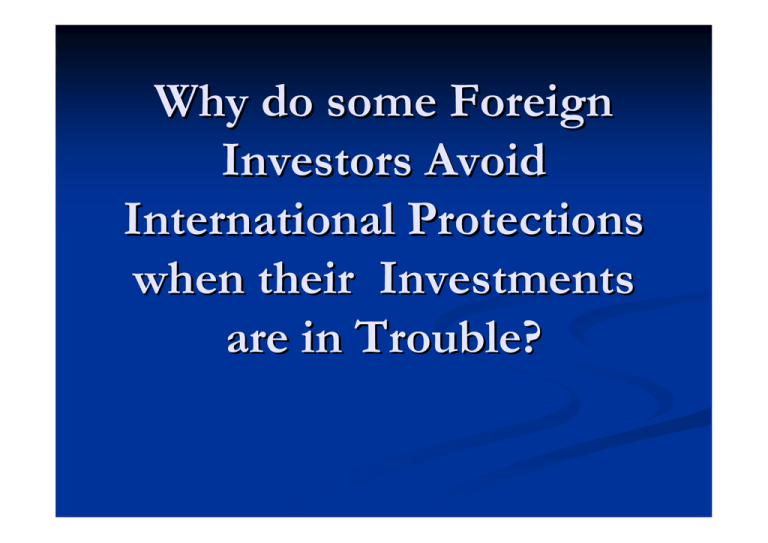Why do some Foreign Investors Avoid International Protections when their Investments
advertisement

Why do some Foreign Investors Avoid International Protections when their Investments are in Trouble? Reasons for BITs and other Protections for Foreign Investors Expropriations (rare, now) Contract change (common) New laws or regulations that harm investment What are the Principal Sources of External Protection? 1. Failure of multilateral negotiations 2. Arbitration 3. Official political risk insurance 4. Home government intervention Frequency of Use? Arbitration at ICSID 1972-1982 1982-1992 1992-1996 1997 -2004 10 cases 18 cases 8 cases 71 cases Arbitration based on BITs but outside ICSID Maybe 160 as of 2004 Why the Increase? 1. Spread of BITs and RTAs (but contracts often had arbitration clauses) 2. Private investment in infrastructure (half of cases) 3. Increase in raw material prices Infrastructure Problem 1. 2. 3. 4. New, inexperienced investors Nature of contract (debt-like) Political sensitivity Lack of “bargaining power” Learning from the Indonesian Power Projects 26 electricity generating projects (1994-1997) 19 foreign owned (13 w/ US participation) All but one with powerful local partners 11 with Suharto children 5 with relative of other officials, cronies, or military society 2 with unknown partners 1 with non-political partner, paid for shares US $ pricing, take-or-pay Price (Paiton I) = 8.56 c/kwh Return: 32% on equity? Asian Currency Crisis as Trigger 1. Exchange rate: 2,400 to 15,000+ ($ contracts) 2. Recession (GDP down 14%): take-or-pay Demand for renegotiation and rescheduling Outcomes in Indonesia (1) Renegotiated (power companies) Paiton I: Mission Energy Tanjung Jati B: Sumitomo Paiton II: Siemens Pare-Pare: ? Outcomes (2) Renegotiated: oil/ gas companies Sengkang: El Paso Palembang Timur: Coastal Salak: Unocal Darajat: Amoseas Sarulla: Unocal Wayang Windu: (sold to Unocal Sibayak: Enserch Outcomes (3) Agreed to close out Tanjung Jati A: Tomen/National Power (UK) Tanjung Jati C: Gordon Wu Outcomes (4) Users of International Protection Dieng: CalEnergy/MidAmerican. Arbitration/OPIC claim Patuha: CalEnergy/MidAmerican. Arbitration/OPIC claim Karaha Bodas: Caithness, FPL. Arbitration (with private insurance) Pasuruan: Enron. MIGA claim Arbitration Awards (1) Karaha Bodas (Caithness and FPL) $261 million on claimed investment of $90 million “Double dipping” Insurance of $75 million on top Collected award, plus interest, about 8 years later Arbitration Awards (2) CalEnergy/MidAmerican Flawed arbitration Requested $3 billion Awarded $570 million Collected $290 from OPIC/private Patterns Arbitration or insurance if: No other business in country And exiting business anyway Renegotiate if: Other significant business in country (oil) Japanese lead investor Government Intervention United States Threats to aid, GSP, votes in multilaterals Reimbursement of OPIC Change with end of Cold War Future? Japan Proposed low cost loan to Indonesia Finally, lease arrangement, without precedent dangers Are Japanese Attitudes Different? Only one Japanese firm in arbitration against host state No Japanese arbitrators at ICSID Not absence of BITs Not that Japanese firms avoid risky countries Not that Japanese firms avoid risky industries Not that Japanese firms always have diverse interests in country Culture, experience? Problems with System of Arbitration Rigidity of view of contract Inconsistent results Lack of consideration of national goals (environment, for example) Asymmetry Damages orientation Can Arbitration be Improved? 1. Appeals process (with broad representation) 2. Make BITs symmetrical Consistency, better awards calculations, less rigid intepretation of contract, evolving Sense of fairness, less rigidity 3. Encourage settlement Can Change be Effected? Entrenched interests in current system Yet, host countries withdrawing or fighting judgments (Argentina, Bolivia, Ecuador, Venezuela) Many investors see as in adequate Will investors support change?





